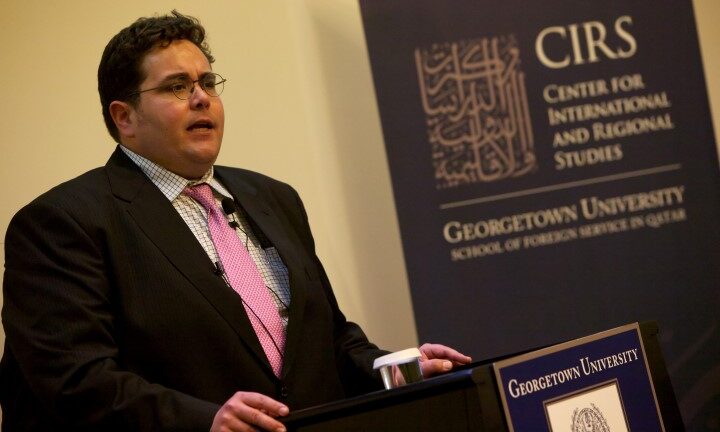Dialogue Series, Distingushed Lectures, Race & Society
Brendan Hill on Sin and Civil Society

Brendan Hill, Associate Dean of Student Affairs at the Georgetown University School of Foreign Service in Qatar, delivered a CIRS Monthly Dialogue lecture on “Sin and Civil Society: Modernity and Moral Regulation in 18th Century England” on April 6, 2011. Attending the lecture were students, faculty and staff, locally-based ambassadors, and other members of the Qatar community.
Trained as a legal historian, Hill said that he did not set out to study morality and sin during his research, but soon became engrossed in the subject of eighteenth century criminalization of behavior and began to study the subject more seriously. Hill’s research focuses on the jurisdictional shifts and the movement away from ecclesiastical courts into secular courts and how this new form of legal, rather than religious, control and fashioning of behavior had different effects on society. He pointed to the paradox at the crux of his research which is that the eighteenth century is widely believed to be a time of enlightenment and growing secularization and, yet, Hill said during this time there was a growing number of prosecutions for moral offences largely documented by puritans in a movement called the Society for the Reformation of Manners.
Although there is no common definition of puritanism, Hill argued, there is a general consensus among historians that puritans believed that society should be ordered according to an ethical code that is derived from scripture. According to Calvin’s doctrine “the church instructs and the state enforces.” The reason why the fashioning of civil society was so important to puritans, Hill said, was because they believed that one person’s guilt was something that was burdened by all individuals in society. “If guilt and judgment are collective, then the crimes of even a few of us are going to visit God’s wrath upon the whole society. So, if the notion of sin becomes collectivized, then the notion of punishment also becomes collectivized,” Hill explained.
Hill highlighted the three main contributions that his research makes to the study of legal and church history. The first contribution is to further the understanding of the process of secularization that occurred in England in the eighteenth century and, by so doing, problematize the idea that enlightenment Europe was a complete move away from religion into the realm of reason. “Historians and political scientists tend to nowadays take it for granted that English society – and essentially European society – is a secular society” that worked toward the presumed replacement of religious imagination with reason and the separation of church and state. Hill argued that “my research is pointing toward less of a ‘secularization’ of the European imagination and more toward a ‘sacralization’ of civil society. Rather than becoming secular in the eighteenth century, England was in the process of conflating the secular and the sacred.”
The second contribution his research makes, Hill said, was highlighting the fact that puritans and puritanism didn’t really die out in the manner that the restoration literature suggests. Historians usually portray puritans as comical figures that no longer had a voice in the body politic during the eighteenth century. Hill, however, suggested that puritan movements actually found a more effective way of channeling their efforts to reform society through “the colonization of civil society” and infiltrating the emerging secular state as officially elected members of parliament.
A third contribution to the literature, Hill said, is to question the notion of positive progress. He argued that “there is an idea that civil society brings progress and that civil society eradicates old forms, and that civil society pushes the way through tradition and moves toward modernity.” But, he said, the complexities of civil society mean that a new formation of that society can never be fully divorced from the former ideology. Any supposedly liberal society will certainly have strong elements of conservatism in the mix. Hill said that he examines how “civil society in the eighteenth century was not only responsible for the creation of tolerance and the separation of church and state, but was also responsible for the sacralization of secular society.”
Hill concluded by outlining the reasons for the decline of official puritanim in England. He argued that the puritans became so prevalent a force in the ordering of civil society that the truly secular elements of the state, including the monarchs, became increasingly worried. Regardless of the decline of puritanism per se, puritans were in fact responsible for the creation of the police state and its monitoring of society as one of the hallmarks of modernity. “In a very strange way,” Hill said, “the Society for the Reformation of Manners created the modern state,” but their influence on current behavioral codes has been forgotten. Over the years, people have become increasingly ignorant of the puritanical basis of current laws, including those pertaining to prostitution and blasphemy.
Brendan Hill earned his B.A. in Philosophy from the University of Hawaii at Manoa and his Ph.D. in European History from Georgetown University. He specializes in church and legal history, and his research focuses specifically on the criminalization of sin and the creation of a godly society at the dawn of the modern era in England. In addition to teaching survey courses on the history of Europe, England and Ireland, he teaches smaller seminars on the cultural roots of ethnic conflict and on the evolving relationship between the secular and the sacred in modern Europe.
Article by Suzi Mirgani, Publications Coordinator